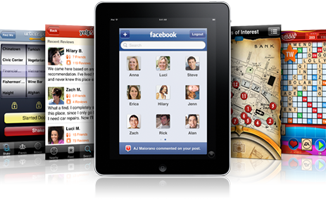Busy as anything, ever, as I’m sure you can guess from my absence hereabouts. How busy am I? I still have not lain my own hands on an iPad. Tried to make time a couple-three times, but I couldn’t squeeze out the seconds.
But I have been paying attention to the aghastrointestinal noises made by the sputtering pundidiot class about the iPad, to some amusement. Translated into a language ordinary people can understand, the main objection runs like this: “These beach socks will look terrible with my tuxedo!” Could not agree more. But if you’re clamming or gigging frogs, you might-could find them a good fit.
Whatever. The iPad’s day is but barely begun, and one of the revolutionary things it will do is wash away this entire cadre of washed-up technology “experts.” Here’s hoping they can find a job worth doing.
Meanwhile, Richard Riccelli passed along this catalog of Grave Portents published by that citadel of techspertise, Slate magazine. Richard’s question is this: With the iPad and its closed software universe, has Steve Jobs committed an unforced error — unnecessarily created an obvious opening for Google and MicroSoft to compete?
My answer is no to everything.
Every kvetch about the iPad comes from people who will not be its audience.
1. It’s not a laptop. Duh.
2. It’s a closed hardware/software universe. Thus does Apple piss off 40% of the INTJs — 2.8% of the buying public.
3. It fosters a market opening for losers who could have beaten Apple ten years ago — except they’re losers.
We’ll have to wait to see it — Alice in Wonderland is an early mover (that munches up all of Brad Inman’s stale Vookies) — but the software built to take advantage of the unique iPad hardware will be killingthing.
Jobs is not wrong. Jobs is early. As always. Why? Because the future doesn’t exist until he invents it. Not hero worship, just an awareness of the amazing things the man causes to be done.
The two big iPad stories, going forward: How cool this tool is, and how lame are the clones.
Don’t believe me? Go buy an Android. Go buy a Zune. Google Read more


